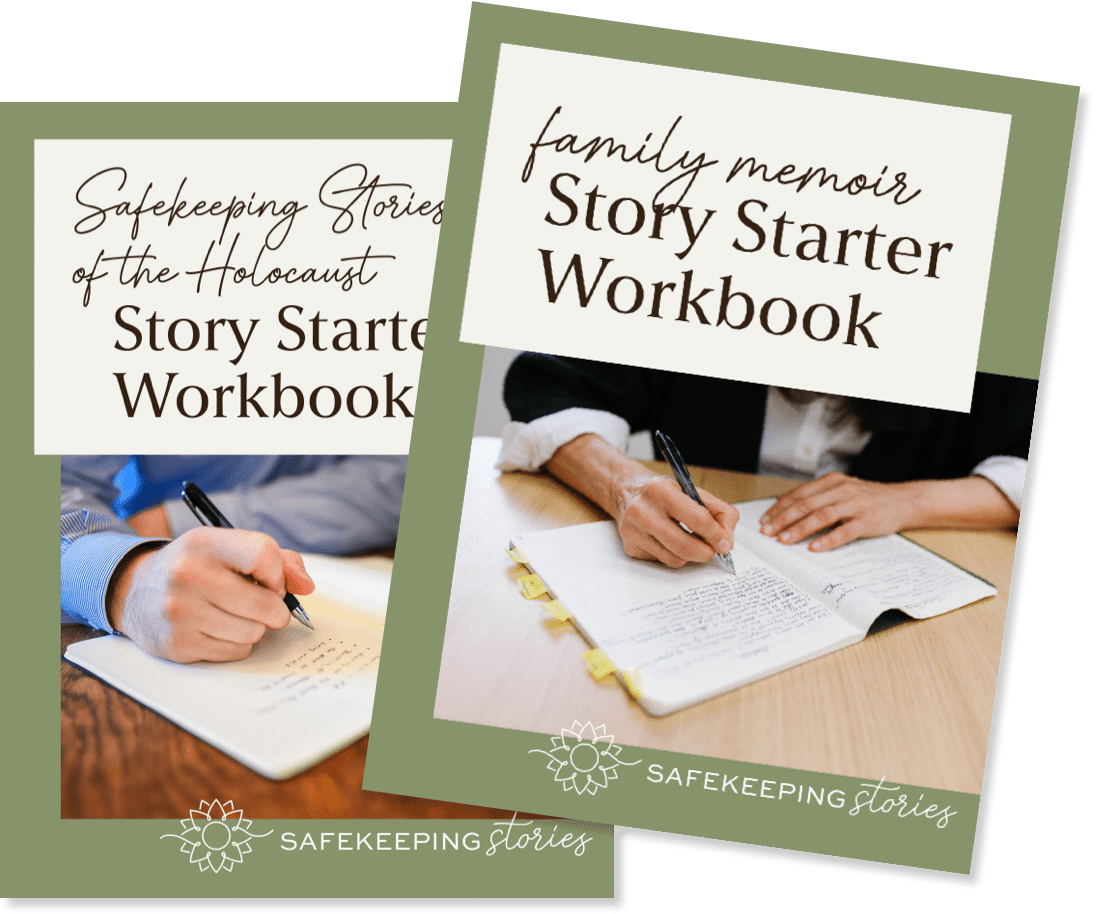If you regret that you didn’t ask your mom or dad family history questions when you could, it’s not too late. There are people who have memories and stories to share with you. They can offer new perspectives that bring a bigger picture of your mom or dad’s life into focus. And you may find that reflecting with them about your mom or dad is a surprisingly enjoyable experience.
Finding People Who Have Memories to Share
Susan was writing about a pivotal time in her mom’s life but had unanswered questions about the sequence of events. Her mom had Alzheimer’s disease, and Susan couldn’t have conversations with her anymore. “Why didn’t I ask?!” she lamented. My heart went out to her. Still, I encouraged her to write down her family history questions and stay curious.
At some point, her former neighbor Barbara came to mind. When Susan was growing up, Barbara often had coffee and long talks with her mom at her house. Could Barbara answer her family history questions? Although they hadn’t spoken in years, Susan found her on Facebook, reached out, and arranged a time for a phone call. It turns out Barbara did have some answers and, more importantly, provided a meaningful perspective on her mom’s life.
Here’s how to ask family history questions—you know more than you think you do.
Who May Have Answers to Your Family History Questions?
Your Family Has Answers!
Of course, “family” holds many answers to your family history questions, but are you considering all the family members who could be helpful?
Immediate Family
Close relatives—your grandparents, aunts, and uncles—likely come to your mind first. After all, they are your mom and dad’s immediate family. These family members can offer direct memories and first-hand knowledge of your mom or dad’s significant life events. People they lost, illnesses, major moves, career changes, life challenges, accomplishments, and celebrations. There’s also a chance these were significant events in their lives. If these family members are still around, they’re your first resource for exploring your family history questions.
Try this simple technique to capture what you know about your mom and dad’s life.
First Cousins
Your mom or dad’s first cousins may have answers to your family history questions. They were the kids your mom or dad sat next to at Thanksgiving and played during family visits or vacations. They spent time together at family gatherings when they had to be quiet and entertain themselves. As adults, they may have stayed close or reconnected at family events like weddings and funerals. It’s easy to slip into reflective conversations when life and family feel most precious, especially when you share a childhood history. In addition, the children of First Cousins may be a resource for your family history questions. Their parents may have told them stories growing up about your mom and dad.
Grandchildren
Family members younger than you might not seem like family history resources. However, sometimes family stories skip a generation, leaving grandchildren with the most knowledge about the family’s past. Grandparents may feel more reflective later in life, sharing personal memories with their grandchildren they never told their children. This is particularly true when passing down keepsakes or answering family history questions for school projects.
Grandparents often approach their relationships with their grandchildren with a sense of legacy. Your younger family members may have insights into the family’s history that are well beyond their years.
When speaking to grandchildren, make sure your questions are age-appropriate. Don’t discuss adult issues with grandchildren who are still children. Remember to think beyond your immediate family line—the children of First Cousins are also grandchildren!
“Family Historians”
Is there someone in your family who never misses a birthday or anniversary or devotes time to organizing family gatherings? They may not consider themselves family historians because they aren’t researching genealogy. Still, they capture the photos at family events and share family pictures via email. They regularly post old photos and memories of their parents, siblings, or cousins on social media. These unintended family historians are excellent resources for family history questions. They focus on the people and moments that matter.
In-Laws
In some cases, those who have married into your family can offer a fresh perspective on your family history questions. They may have been included in a wide range of conversations over the years because they are “safe” listeners. Since they’re outside the historical family dynamic, in-laws must ask clarifying questions to understand the context. While this relationship can be tricky in some families, in-laws of any age may offer factual recollections and a unique or impartial perspective on your family’s past.
Discover Family History Knowledge Outside Your Family
Answers to family history questions aren’t limited to family members. Your mom or dad led a life that included friends, neighbors, and possibly work colleagues. They can help fill in the missing pieces and offer perspectives of your mom or dad as an individual. They can bring new dimensions of understanding to your family history questions.
Friends: Your Parents as People
Your parents’ friends span many life stages—-from childhood to college, marriage, parenthood, and even old age. These friends were there to witness their hopes, struggles, and dreams. They can likely answer your family history questions about their significant life events. They can tell you about the character traits they admired in your mom or dad and describe their personal triumphs and challenges. They bring a clear-eyed view that’s uncolored by family dynamics.
Neighbors Add Context of Time and Place
Neighbors may have answers to your family history questions, and they may provide the context for what you already know. They might offer physical descriptions of your mom or dad, their home, or other family members. Neighbors can tell you how your mom or dad was perceived within the community. They can explain the social norms and values of the time or share poignant memories about living nearby. They could have watched your mom or dad grow up, observed them evolve through the joys and challenges of adult life, or witnessed their resilience through illness or aging.
Work Colleagues Can Reveal a Different Side of Your Mom or Dad
Work colleagues can be an unexpected resource for some of your family history questions. Whether your mom or dad was an employee, a boss, or a business owner, they spend a lot of time at their place of work. Your mom or dad probably shared stories about their life with their colleagues. These coworkers can share a unique perspective of your parent as a professional. This aspect of their identity may not have been visible at home.
Create a Discover List for Your Family History Questions
A Discover List is a flexible brainstorming tool that will help you access memories, information, and ideas in your mind. Follow these steps to make a Discover List of people who might answer your family history questions in about five minutes.
1. Use Pen and Paper
There are many benefits to writing with pen and paper. You are more focused because there are no digital distractions. Because you use fine motor skills to hold your pen, you engage more of your brain when writing than when typing on a keyboard. Writing is slower than typing, and this gives your brain more time to process.
2. Choose a Place to Write Your Discover List
You can use a simple bound notebook, a 3-ring binder, or even a bound pad of paper. At the top of a clean page, write: “Discover List: Family History Questions.” If you’re gathering information about your mom and dad, make a separate Discover List for each.
3. Set a Timer for 5 Minutes
Set your timer and jot down the names of people who might be able to answer your family history questions. You can refer back to the suggested categories above to jog your memory. Don’t censor yourself—just write down anyone who comes to mind. You will decide later who you will contact.
4. Close Your Notebook When Time’s Up
When the timer ends, put your pen down. You are done for now. Your subconscious mind will keep working on this list. You may think of other people who can answer your family history questions later. When you do, jot their name down right away so you don’t forget.
5. Pick One Person to Contact First
For your first conversation, pick the person that is easiest for you to contact. It might be someone you know well or are motivated to find, but just pick one person and set up a time to talk.
Would you like to write a family memoir about your mom and dad to give to your kids? Our Family Memoir Workshop is a live workshop that guides you through the process in 8 weeks. Or you can work with us One-on-One whenever it works for you!
The Power of Stories
People who have answers to your family history questions may just be a few minutes of reflection away. Connecting to people who mattered to your mom and dad can give you a new perspective on who they were, bringing their presence and love to the here and now. That is the power of stories!




